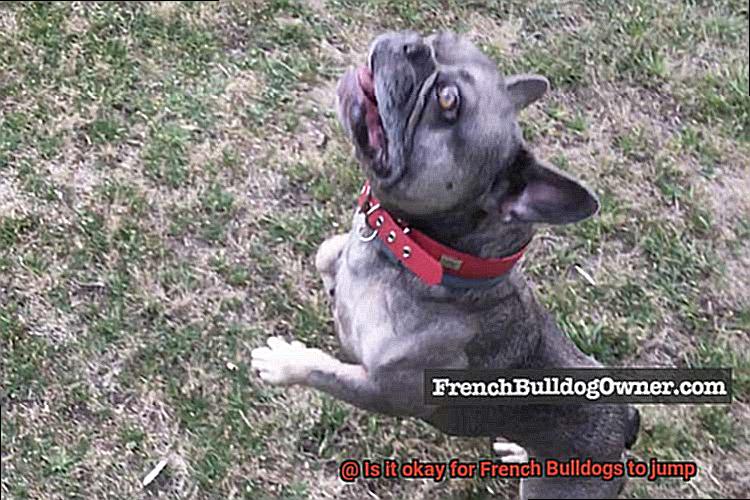Is it okay for French Bulldogs to jump?
French Bulldogs are known for their playful and energetic personalities, making them a popular choice among pet owners. If you’re a proud owner of a French Bulldog, you’ve probably witnessed your furry friend’s love for jumping and playing around. But as a responsible pet owner, you might be wondering whether it’s okay for French Bulldogs to jump or not.
Well, the answer isn’t straightforward – it’s both yes and no. Jumping is a natural behavior that allows dogs to burn calories, release pent-up energy, and have fun. However, excessive jumping can cause various orthopedic problems such as joint pain, hip dysplasia, and arthritis – especially in French Bulldogs who have a muscular structure not designed for frequent or prolonged jumping.
So how do you balance the desire to play with your dog’s safety? In this blog post, we’ll explore the pros and cons of jumping for French Bulldogs. We’ll also provide tips on how to train your dog to jump safely and share precautions you should take to prevent any injuries.
Join us on this journey as we delve into the fascinating world of French Bulldogs and their love for jumping.
Why Jumping is an Important Concern for French Bulldog Owners
Contents
- 1 Why Jumping is an Important Concern for French Bulldog Owners
- 2 Physical Limitations of French Bulldogs
- 3 Risks Associated with Jumping in French Bulldogs
- 4 Moderation is Key When it Comes to Jumping
- 5 Tips for Minimizing the Risk of Injury from Jumping
- 6 Signs that Too Much Jumping Could be Harmful
- 7 Exercise Alternatives to Jumping for French Bulldogs
- 8 Conclusion
However, their jumping tendencies can pose a serious risk to their health.
Due to their stocky build and short legs, French Bulldogs are more susceptible to injuries when they jump or land awkwardly. Additionally, excessive jumping can put a tremendous amount of strain on their joints, leading to joint problems like hip dysplasia and arthritis. In some cases, jumping can even cause spinal injuries that require surgery.
As a responsible owner, it’s essential to take steps to prevent your French Bulldog from jumping excessively. This includes providing them with low-impact exercise options like swimming or walking, using stairs or ramps instead of allowing them to jump up onto furniture or into cars, and training them not to jump unnecessarily.
It’s also important to be aware of the signs of joint problems or injuries in your furry friend. Limping, stiffness, and reluctance to move are all indicators that your dog may be experiencing joint pain or injury. If you notice any of these signs, seek veterinary care immediately to prevent further damage.
Physical Limitations of French Bulldogs
French Bulldogs, or “Frenchies,” are a delightful breed of small domestic dogs known for their playful and affectionate nature. However, their physical characteristics can limit their ability to participate in certain physical activities, such as jumping.
One of the most significant physical limitations of French Bulldogs is their compact body with a broad chest, short legs, and flat face. These unique features make them prone to respiratory problems, which can make jumping a significant challenge for them. Jumping requires a lot of energy, which can cause respiratory issues and even heatstroke.
Moreover, Frenchies have an elongated spine and short legs that make them more susceptible to spinal injuries. Jumping from high surfaces like furniture or stairs can put excessive strain on their spine, leading to lifelong complications such as difficulty walking, standing or even paralysis.

Additionally, Frenchies have a higher risk of joint problems such as hip dysplasia that can make jumping painful and difficult. Engaging in activities that are too strenuous can exacerbate these joint problems and lead to further complications.
It’s crucial to monitor your Frenchie’s activity levels carefully and provide them with activities that are suitable for their physical capabilities. Avoid allowing them to jump on furniture or into cars without using stairs or ramps. Instead, low-impact exercise options like walking or swimming are ideal for keeping them active without putting too much strain on their bodies.
Risks Associated with Jumping in French Bulldogs
It’s important to recognize that French Bulldogs are not built for jumping and such activities can pose significant risks to their health.
One of the major risks associated with jumping in French Bulldogs is respiratory issues. Due to their brachycephalic breed, they have a short snout and compressed upper airway, making it difficult for them to breathe. Jumping or exerting themselves can cause further strain on their respiratory system and worsen any existing breathing difficulties.

Additionally, French Bulldogs’ relatively heavy bodies compared to their short legs can lead to orthopedic injuries such as fractures or dislocations when they jump from high surfaces like furniture or stairs. Over time, this can cause chronic pain and mobility issues, including arthritis and other joint conditions.
The danger doesn’t end there. French Bulldogs are also susceptible to spinal cord damage due to their short legs and long backs. Landing awkwardly after a jump can result in severe spinal injuries, leading to paralysis, loss of coordination, or even death in extreme cases.
To keep your beloved French Bulldog healthy and happy for years to come, it’s advisable to limit their jumping activities and provide alternative forms of exercise that are less strenuous on their bodies. Low-impact exercises such as walking or swimming can be great alternatives that don’t put them at risk of injury.
Moderation is Key When it Comes to Jumping
French Bulldogs are energetic and playful dogs, and jumping is one of their favorite activities. But as a responsible pet owner, it’s important to know that moderation is crucial when it comes to this activity.
Excessive jumping can cause injuries and long-term damage to your Frenchie’s health. Their short legs and compact bodies make them more susceptible to orthopedic issues like hip dysplasia and patellar luxation. Jumping too frequently or too high can worsen these conditions, leading to pain, discomfort, and even more severe orthopedic problems.
Jumping can also put a strain on your French Bulldog’s respiratory system. Their short-nosed faces make breathing difficult in certain situations, especially when they are overweight or out of shape. Jumping can cause heavy panting and even lead to respiratory problems.
Therefore, it’s essential to practice moderation when it comes to jumping with your furry friend. Keep an eye on their physical limitations and overall health, ensuring that they don’t struggle or show signs of discomfort or pain after jumping. If you notice anything unusual, consult with a veterinarian.
Instead of excessive jumping, consider low-impact exercises like walking or swimming. These activities provide plenty of fun and exercise without putting your Frenchie at risk for injury or health issues.
Tips for Minimizing the Risk of Injury from Jumping
Your furry friend is undoubtedly one of the most playful and energetic members of your family. However, as experts in the field, we understand that their short legs, heavy bodies, and susceptibility to health issues like hip dysplasia can make jumping a risky activity for them. That’s why we’ve compiled five tips for minimizing the risk of injury from jumping in French Bulldogs.
Train your French Bulldog to jump properly
Proper training is crucial for teaching your French Bulldog how to jump safely. Start with low jumps and gradually increase the height as your dog becomes comfortable. Make sure they land softly on their feet to prevent any impact on their joints.
Use ramps or stairs
If your French Bulldog needs to get on furniture or climb stairs, consider providing them with a ramp or stairs instead of allowing them to jump. This will reduce the impact on their joints and minimize the risk of injury.
Provide a soft landing surface
When your French Bulldog is going to jump, ensure there’s a soft landing surface such as grass or a mat. This will help absorb the impact and reduce the risk of injury.
Keep your French Bulldog at a healthy weight
Excess weight can put extra strain on your French Bulldog’s joints, increasing the risk of injury from jumping. Ensure your dog maintains a healthy weight through a balanced diet and regular exercise.
Regular check-ups with a veterinarian
Regular check-ups with a veterinarian are crucial for monitoring your French Bulldog’s health and catching any potential issues early on. Your veterinarian can provide guidance on exercises and activities that are safe for your French Bulldog.
French Bulldogs are adorable but susceptible to injuries due to their body structure and health issues. Following these tips is essential for keeping them healthy and happy while still allowing them to enjoy their playful nature.
Signs that Too Much Jumping Could be Harmful
French Bulldogs are known for their playful and energetic nature, often including jumping as part of their fun. However, excessive jumping can take a toll on their health, leading to injuries or long-term health problems. As an expert on this topic, I have identified several signs that too much jumping could be harmful to French Bulldogs.
Firstly, if your French Bulldog is limping or favoring a particular leg, it could be a sign of a joint or muscle injury caused by excessive jumping. If they experience pain when walking or standing, it’s time to limit their activity and seek veterinary care to prevent further harm.
Secondly, French Bulldogs who jump frequently are at risk of developing spinal problems. Jumping puts a lot of pressure on the spine and can cause damage to the vertebrae or discs. If you notice your furry friend having difficulty moving, reluctance to jump or climb stairs, or sensitivity around the back or neck- these could be signs of spinal problems that need immediate attention.
Lastly, respiratory problems can also arise from excessive jumping. Jumping requires a lot of energy and can cause your French Bulldog to become short of breath or experience breathing difficulties. If you notice coughing, wheezing, and difficulty breathing in your French Bulldog- it’s time to take them to the vet.
Exercise Alternatives to Jumping for French Bulldogs
However, excessive jumping can lead to serious health problems like joint injuries, spinal damage, and respiratory issues. Therefore, it’s essential to keep an eye out for signs of discomfort and seek veterinary care if needed.
Fortunately, there are plenty of exercise alternatives to jumping that can keep your French Bulldog healthy and happy. Here are some of the best:
Firstly, walking is a low-impact exercise that provides numerous benefits for dogs. It can improve cardiovascular health, weight management, and mental stimulation. Plus, it’s an excellent bonding activity for you and your Frenchie. Why not take your dog on a brisk stroll around the neighborhood or through a nearby park?
Secondly, swimming is another fantastic exercise alternative that’s gentle on your Frenchie’s joints. It can help improve muscle tone, cardiovascular health, and mental stimulation. Plus, most dogs love to swim. If you have access to a pool or lake, give swimming a try.
Thirdly, agility training is a fun way to burn off energy while promoting strength and endurance in your French Bulldog. However, it’s crucial to start slowly and gradually introduce agility equipment as your dog builds up their strength.
Lastly, interactive toys like puzzle feeders or interactive balls provide mental stimulation and physical exercise without the need for jumping. These toys can keep your Frenchie engaged and active while promoting problem-solving skills.
Em5WE9QFfa0″ >
Conclusion
To wrap up, French Bulldogs are a lively and spirited breed that loves to jump and frolic. However, their bodies are not well-suited for excessive jumping due to their muscular structure, which can lead to orthopedic issues such as joint pain, hip dysplasia, and arthritis. Therefore, it’s essential to strike a balance between your furry friend’s desire to play and their safety.
As an authority on this topic, I’ve provided valuable insights into the physical limitations of French Bulldogs that make them prone to injuries when they jump or land awkwardly. Additionally, I’ve discussed the various risks associated with jumping in French Bulldogs such as respiratory problems, orthopedic injuries, and spinal cord damage.
To minimize the risk of injury from jumping in French Bulldogs, it’s crucial to train them how to jump properly. You can also use ramps or stairs instead of allowing them to leap onto furniture or into cars. Providing a soft landing surface when they do jump is equally important. Keeping your Frenchie at a healthy weight through a balanced diet and regular exercise is also critical.
Lastly, I’ve suggested alternative exercises for French Bulldogs that don’t involve jumping but still provide mental stimulation and physical activity. These include walking, swimming, agility training and interactive toys like puzzle feeders or interactive balls.




